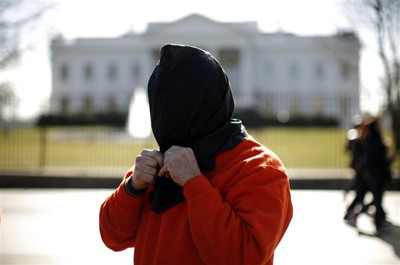Reuters, March 25, 2010
A Guantanamo Bay in Afghanistan?
Anger over night raids and arbitrary detentions by international military forces ranks second to that of civilian casualties, the London-based lawyer says

A protester outside the White House in Washington dressed as a Guantanamo Bay detainee. (Photo by Kevin Lamarque)
The United States is considering a proposal to hold foreign terrorism suspects at the Bagram military base in Afghanistan, the Los Angeles Times reported this week, a new Guantanamo Bay just as it is trying to close down the original facility in Cuba.
Given the amount of trouble that Washington has run into for running a detention centre where prisoners have no access to the U.S. court system, it sounds like a bad idea to be setting it up in Afghanistan, say experts.
A “very bad idea”, actually, says human rights lawyer Sahr Muhammedally, to be doing this at a time when the U.S. military is trying to win the support of the Afghan people as the centrepiece of its strategy to reverse the tide of the eight-year war.
Guantanamo Bay is an ugly name in Afghanistan, with scores of Afghans held for anything from two to five years without any opportunity to defend themselves. To be now trying to create a mini-Gitmo in the country must come as an affront to many of them, says Muhammedally in this article for Foreign Policy’s AFPAK Channel.
Anger over night raids and arbitrary detentions by international military forces ranks second to that of civilian casualties, the London-based lawyer says. Expanding the Bagram detention centre, which already stands along with Guantanamo Bay and Iraq’s Abu Ghraib as a symbol of harsh treatment of detainees, must come as a further provocation.
In any case the whole thing is legally impermissible. ”The business of capturing and transporting individuals from different countries to Afghanistan, which is an area of conflict, for warehousing beyond the rule of law and access to courts in laymen’s term is kidnapping — something that the United States should not be promoting as a matter of policy and constitutes a crime,” Muhammedally says.
The logic as advanced by some in the United States is that you need to have a foreign detention centre to question suspects while not having the evidence to prosecute them. Otherwise you will have to hand them over to foreign governments, bring them to the United States, or quite simply kill them.
In one case last year, U.S. special operations forces killed an Al Qaeda-linked suspect named Saleh Ali Saleh Nabhan in a helicopter attack in southern Somalia rather than trying to capture him, a U.S. official said, according to the Los Angeles Times.
Officials had debated trying to take him alive but decided against doing so in part because of uncertainty over where to hold him, the official added.
Characters Count: 3178
